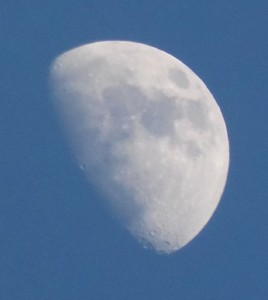I was thinking of Caroline and William Herschel tonight, counting the many thousands of visible stars, not once being daunted by the enormous task. For most people in the cities, who only hear about the stars by report, or see them once a year on a camping trip, the full splendor of the night sky in the northern winter is hard to describe.
Tonight there are no clouds at all, and the Milky Way streams across the sky. The big dipper seems lower than in the summer, and more  vivid, and stars shine between the trees that I swear I’ve never seen before.
vivid, and stars shine between the trees that I swear I’ve never seen before.
I fancied that I could tell which cluster was the lesser Magellanic Cloud, and pondered how William and Caroline Herschel stood for long hours in the backyard with their telescopes and counted. They were meticulous in their record keeping until they could state with certainty the amount and possible configuration of the near stars.
I often think of my teaching as a contribution to society. I think I am doing more than instilling a dry understanding of literary technique, but believe rather that my students leave with more of a cultural understanding and sensitivity that they arrived with. Also, I’ve dreamt that my writing was of some import. That beyond mere telling stories, and what I’ve called the twitching of fingers above a keyboard, that I’ve sent out visions and methods of coping that without me would, I admit, likely be supplied by another.
I commented one time on a friend’s taste in books, referring, pompously enough, to the novels he liked to read as escapist. He came back with a response which stalled me for two days: “But isn’t all reading escapist?”
I thought about that, pondering the reasons I read and what I thought I gathered from a book other than the passage of time. I finally decided, and reported to him, that I read to cope. I read to learn skills and visit other cultures and viewpoints, to meet people and see how they act in such a situation so that I may decide how I should react. I read for the opposite reason than escapism. I read to more thoroughly trap myself in the interstices of culture, to prod unexamined common understandings and to better learn my place in the world. To say that reading is escapist is like claiming that a university student is merely wasting time, and that a scientist is using money that were better spent being drunk.
I read because the library is the best thing that we are. That great storehouse of human wisdom and idiocy, laid bare for anyone to enter and peruse, is our cumulative heritage, and to forgo that for whatever other pursuits are seemingly more meaningful, making money and praying to an indifferent sky seems like the waste of a life.
The view of my friend might disdain the laborious nights of the Herschel siblings and cast aspersions on what goes on in a university classroom. What standard they would hold up as worthy I wouldn’t hazard to guess, but likely it is written somewhere in the library if they but took the time to find the origin of their original and independent thought.
